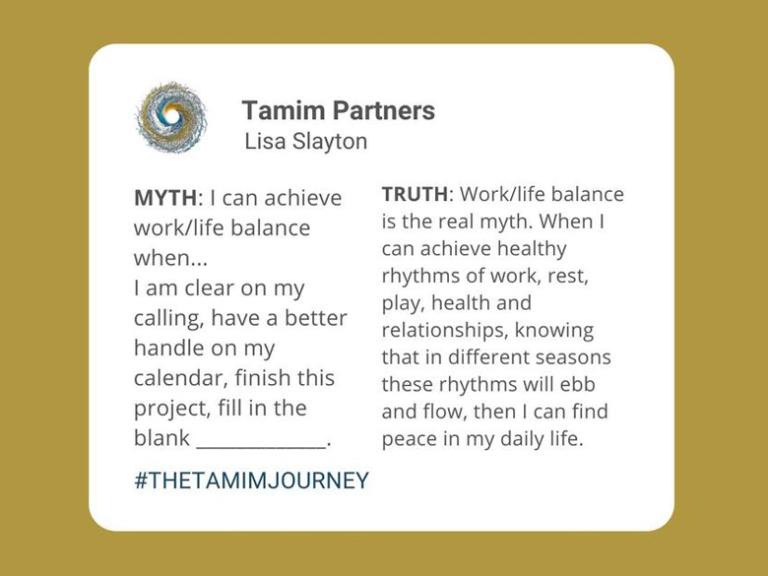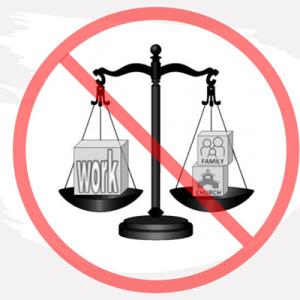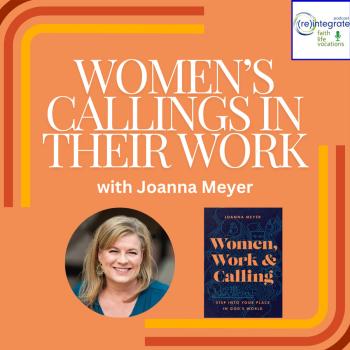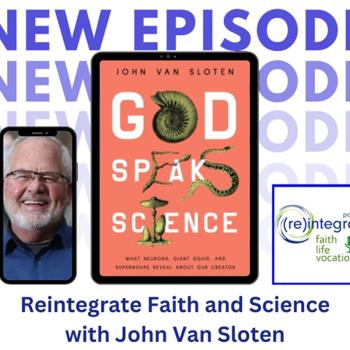Lisa Slayton, founder of Tamim Partners and Director for CityGate (of the Denver Institute for Faith and Work) recently posted this on social media:

Myth: I can achieve work/life balance when… I am clear on my calling, have a better handle on my calendar, finish this project, fill in the blank _____________.
Truth: Work/Life balance is the real myth. When I can achieve healthy rhythms of work, rest, play, health and relationships, knowing that in different seasons these rhythms will ebb and flow, then I can find peace in my daily life.
In my previous life as a pastor (after a life before that as a successful businessperson), I empathized deeply with the chaotic lives people had in their workaday world. In a culture that celebrates workaholics, pastors see too many people making work an idol which makes them too busy for church, family, or service.
In an age where people overwork, church leaders feel the need to find ways to help congregants balance work with the rest of life.
We’re Just Making it Worse.
 But in trying to help, we pastors make a grave mistake: We tell people to strike a balance between work and the rest of life.
But in trying to help, we pastors make a grave mistake: We tell people to strike a balance between work and the rest of life.
Here’s the rub: When we set work apart as if it were on one side of the scale with family and church on the other side, we have created a false dualism. In an effort to help, we are only exacerbating the problem—because we imply that work is contrary to the “important” things in life. When that happens, work can get moved into a category that is separate from the Lordship of Jesus Christ.
What if, instead, we embraced the biblical understanding of the kingdom of God, in which God rules over all aspects of life? What if everything is meant to be “spiritual,” even (and especially!) our work life? What if our pastoral ministries not only helped people serve in the local church and help create healthy families but actually made sense of the work world as well? What if we attempted to rid ourselves of a fragmented view of life?
Harmony and Rhythm: A Much Better Framework.
My adult son Joel has been playing trombone for years. When he was in high school, I’d listen to him practice down in the basement. I enjoyed the sound of his playing (It hasn’t always been like this… There are few things more grating to hear than a young boy blowing into a trombone as he first learns the instrument!).
As he played, I’d enjoy the melody traveling up the stairs. Sometimes that melody was instantly recognizable, and I hummed along. But at other times, I couldn’t identify the tune. What is he playing? Ahh, I’d think, this is not the main melody, but a progression of notes that will add to the harmony of the entire orchestra.

Listening to the full symphonic orchestra is different from listening to just Joel playing his single trombone. The instruments complement each other, creating chord progressions that go toward a destination. There is a definite goal that the composer had in mind, and we are on the journey as we listen.
Think of God as the composer of our lives, with all the various aspects of our living in this world as different instrumental parts. Sometimes the strings and flutes are the center of our attention, playing a sweet melody that is accompanied by the woodwinds and brass playing background harmonies. The music makes you smile as it skips along with joy.
But then the brass takes over with minor notes, which makes you anxious because you know of the tensions of living in a fallen world. The other instruments continue to play, and in fact, there in the back somewhere is that hint of joy still playing.
Then the cellos and woodwinds begin playing the main melody again while the others play harmony, and a whole new dimension of the piece is exposed. You, think, “Oh, that’s where all this was going! Genius!”
It is all working together toward a goal based on the succession of the chords’ root relationships. Even though I couldn’t understand it when I listened to just one instrument played by Joel sitting in the basement, the composer did as he wrote how the various instruments will play out to the end of the symphony.
Here are three lessons from this allegory:
1. Harmony: It All Matters.
As we move through our days, weeks, and years, we will find that at times, certain things need to come to the fore and other things will need to move to the rear, playing in harmony with the main thing at that time. It is not evil to find yourself in the middle of a huge project at work and needing to put in a lot of extra hours to get it done. It would indeed be a problem if this was how you organized all of your time, with only work being the main melody while all your other callings playing in the background.
We have many vocations, many callings, that we must attend to. And it is okay for one of those callings (be it work, family, church life, community service, etc) to be the main thing for a while.
It only becomes a problem if that becomes the only melody that is at the forefront of your life. Allow for the symphony to play, but allow the different movements to shift what is in the forefront as needed.
But never forsake the other callings in your life. They are to be harmonized with what is the most pressing thing at that time.
2. Rhythm: Everything In Its Time.
As Lisa Slayton wrote, “When I can achieve healthy rhythms of work, rest, play, health, and relationships, knowing that in different seasons these rhythms will ebb and flow, then I can find peace in my daily life.”
In other words, we need to be intentional to create healthy rhythms. Work with all your effort. But take time away from the To-Do List to rest in the rejuvenation found in your relationship with Jesus Christ. Take time to play. Be proactive in your relationships. Don’t neglect your health.
Establish rhythms that will sustain you as you go through those hard times.
3. It’s all going somewhere.
Know that God has prepared the way for you. For we are God’s music, created in Christ Jesus to do good work, which God prepared in advance for us to do (see Ephesians 2:10). Jesus is the lamp for our sheet music as we move through the symphony God has written for us.
Balance is not what we are called to achieve. It isn’t even possible.
Instead, let’s harmonize and create rhythms. Let us be assured that we are going where God wants us to go.













